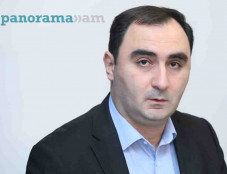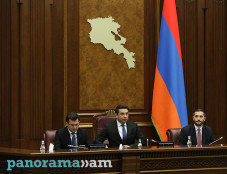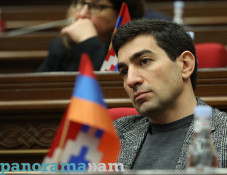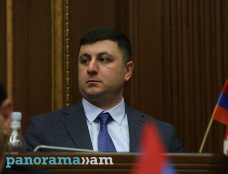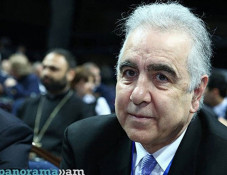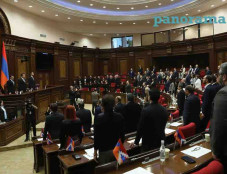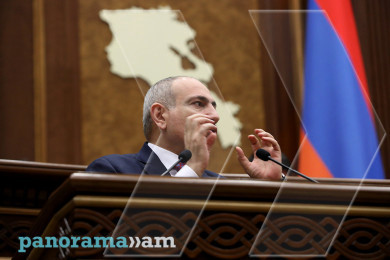
Department of State report: Azerbaijan supports and sponsors Jewish community but persecutes Muslims
Although the constitution of Azerbaijan protects the right of individuals to express their religious beliefs, several laws and policies limit the free exercise of religion, especially for members of religious groups considered “non-traditional” by the government, according to the International Religious Freedom Report for 2014 by the U.S. Department of State.
According to the report, the religious activists detained by the Azerbaijani government were considered by local observers to be political prisoners. Authorities raided gatherings of minority religious groups, including Salafis, readers of texts by Islamic theologian Said Nursi, and suspected followers of the Islamic cleric and theologian Fethullah Gulen. Some religious organizations experienced difficulty registering with the government, and unregistered communities could not openly meet. The government also imposed limits on the importation, distribution, and sale of religious materials.
The government provides support for activities by the Jewish community. Meanwhile, there were incidents where individuals forcibly shaved off Salafi Muslims’ beards, the report reads.
“According to 2011 data from the State Committee on Work with Religious Associations (SCWRA), 96 percent of the population is Muslim, of which approximately 65 percent is Shia and 35 percent Sunni. Groups that together constitute the remaining 4 percent of the population include members of the Russian Orthodox and Armenian Apostolic Churches, Seventh-day Adventists, other Christians, Jews, Molokans, Bahais, and those professing no religion. Since independence in 1991, a number of religious groups considered by the government to be foreign or non-traditional have established a presence, including Salafist Muslims, Pentecostal and other evangelical Christians, Jehovah’s Witnesses, and Hare Krishnas,” the report says.
The Caucasus Muslim Board (CMB) oversees the activities of registered Islamic organizations, including appointing religious clerics to lead Islamic worship, periodically monitoring sermons, and organizing pilgrimages to Mecca.
Azerbaijan authorities may deny registration of a religious organization and while the law prohibits the government from interfering in the religious activities of any individual or group, there are exceptions, the report highlights.
According to the report, the SCWRA reviews and approves all religious literature for legal importation, sale, and distribution in Azerbaijan. According to the law, punishment for the illegal production, distribution, or importation of religious literature can include fines ranging from 5,000 to 7,000 manat (AZN) ($6250 to $8750) or up to two years’ imprisonment for first offenses, and from 7,000 to 9,000 AZN ($8750 to $11,250) or imprisonment between two and five years for subsequent offenses.
There is no legislation in Azerbaijan permitting alternative military service, and refusal to perform the service in peacetime is punishable under the criminal code, the Department of State notes.
The government of Azerbaijan detained religious activists bringing the total number of religious activists deemed to be political prisoners to 52. The authorities persecuted the readers of texts by Islamic theologian Said Nursi, restricted the activities of Jehovah’s Witnesses and some Islamic religious organizations.
The law prohibits proselytizing by foreigners but does not prohibit Azerbaijan citizens from doing so. However, on April 12, police disrupted a Nursi gathering in Baku, arresting 41 people and confiscating religious materials. In April, the court fined a Shia theologian who had been teaching his faith.
In November, authorities detained Salafi community activist Zohrab Shikhaliyev, accusing him of illegal possession of weapons. Other members of the Salafi community said the weapons had been planted on Shikhaliyev by law enforcement officials, who had arrested and detained another nine Salafi adherents. On December 17, the MNS detained well-known religious scholar Elshan Mustafayev. Two days later, a district court sentenced him to four months’ pretrial detention on charges of treason. According to local observers, the government sometimes incarcerated religious activists on spurious charges because of their political activism.
The government reportedly detained Salafis in various parts of the country, confiscated religious materials, and replaced community leaders and imams in mosques suspected of being Salafi gathering places. Although Salafis could attend these mosques, they were prohibited from holding positions of leadership, leading prayers, or delivering sermons, according to the report.
Police conducted raids on suspected followers of Islamic Turkish cleric and theologian Fethullah Gulen and confiscated religious materials. Authorities deported some Turkish nationals and arrested some Azerbaijani citizens on suspicion of Gulen affiliation. Two government officials were removed from their positions due to suspected ties with the Gulen movement.
“Nontraditional religious groups that lacked official registration, both Muslim and non-Muslim, said they continued to have difficulties functioning and on occasion were fined by the government for administrative violations. A number of Protestant leaders cited registration problems that prevented them from openly worshiping, performing sacraments, or advertising their locations to bring in new members,” the Department of State points.
It is noted in the report that controls on a variety of activities by Islamic groups, including religious television broadcasts and the sale of religious literature at metro stations, remained in effect. The government continued to pre-approve television shows, and religious experts noted a tendency to allow only Shia television broadcasts.
Head coverings were allowed in most public places but not in official photographs. An unofficial directive from the then-minister of education prohibited girls from wearing the hijab in primary and secondary schools. The government took no legal steps to implement this directive, and the majority of school administrators throughout the country did not implement it.
Meanwhile, the Jewish community representatives reported authorities continued to support their activities and allow the duty-free importation of religious items.
“The Ambassador and U.S. embassy officials urged government representatives, including senior SCWRA officials, to address religious registration issues as well as obstacles to the importation and publication of religious literature. The Ambassador and embassy officials also met with leaders of Christian, Muslim, and Jewish groups and NGO representatives to discuss obstacles to registration and the importation of religious materials,” the report says.
Related:
Azerbaijani authorities deprived Orthodox believers of possibility of Sunday liturgy
Newsfeed
Videos





